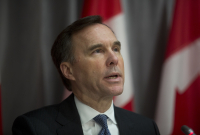Support strong Canadian climate journalism for 2025
Parmoon Sarmadi was already in a fairly dire financial situation when COVID-19 hit.
She had taken on bank loans to cover most of the roughly $17,000 tuition for her master’s degree in biomedical engineering at the University of Toronto and was counting on a paid summer internship, a requirement of the 12-month program, to help make a dent in her debt. She was also eager to contribute to the living costs of her family of four, which otherwise relies on her father as the sole source of steady income.
But after a solid interview for a research position at University Health Network, the offer of a job based at a Toronto hospital never came. Likewise, the many interviews she’d lined up for co-op positions at companies disappeared as they cancelled the programs for this year.
“I'm still trying to look for employment in the summer, but many places are on a hiring freeze, understandably so, and I have no idea how to support myself or my family financially in the upcoming months,” she said. “I feel scared, confused, and unsure of what the future may hold.”
The COVID-19 pandemic has shut down large sections of the economy, throwing an unprecedented number of workers out of jobs in short order and creating massive economic uncertainty.
The federal government has launched its Canada Emergency Response Benefit (or CERB) to pay workers who’ve lost all income $2,000 a month in emergency payments for four months. But it has so far not offered financial assistance to students who were not working when emergency measures to contain the pandemic were enacted but whose summer job prospects have dimmed sharply.
Sarmadi is far from alone in her predicament.
Roughly one million young people between the ages of 15 and 24 hit the job market during their summer break, and this year, there will be far fewer opportunities for them.
“One of the big worries is it's not clear how the current systems are set up to help people who are not going to have a job this summer, not because they've lost their job, but because they aren't going to be hired if this thing persists for more than we think,” said Andrew Agopsowicz, a senior economist at Royal Bank of Canada who studies the impact of economic downturns on young people and other vulnerable workers.
“I think we'll have to start thinking about how people qualify for employment insurance that's not necessarily directly tied to past employment.”
On Sunday, Prime Minister Justin Trudeau said that the government was aware of the challenges graduates face and would have more to say about efforts to help them in coming days.
"We know that we need to do more for young people as they come out of university and look for projects and ways of securing income this summer," he said, suggesting direct financial support was possible and that students might want to consider spending their summer working on a farm or in a fishery.
'We rely on summer jobs'
“Students need help, too,” said Samuel Wiggans. “I’m not looking for a bailout, I’d rather work. But if it’s not possible, the government needs to address that.”
The 29-year-old, who went back to school for a teaching degree last year, has been scouring job classifieds for weeks for any work he can find, without luck.
His five-week placement at an elementary school in Ottawa was cancelled and efforts to pick up summer camp work thwarted in the wake of the COVID-19 pandemic, while even an interview he’d secured for a job delivering food to restaurants was called off.
Wiggans, like many university and college students across the country, had been relying on summer work to cover his bills in the next school year.
Joshua Diemert, a post-graduate public policy student at the University of British Columbia, still has his offer of summer work with the sanctions team at Global Affairs, the federal foreign affairs department. But his start date has been pushed back a month, and it remains uncertain whether they will be able to accommodate him at all.
He’s currently in limbo, unsure whether to seek out accommodation in Ottawa or sublet his place in Vancouver — and how to stretch his budget to account for the lost month of salary.
“The CERB policy is incredibly disappointing because it only worries about people that were already actively working and not people who had work lined up,” he said. “Talk to any undergraduate or graduate, we all rely on summer jobs to finance the rest of our year.”
“I'm going to have to start making decisions about, you know, do I need to access food in alternative ways in order to pay rent, or things like that,” he said.
Offers being rescinded, some remote work possible
Roughly 100,000 students from around 50 educational institutions took part in co-op programs last year, while a similar number completed other work-integrated learning, including field placement, apprenticeships, internships and practicums, according to Cara Krezek, the president of Co-operative Education and Work-Integrated Learning Canada.
She said about half of the institutions that run co-op programs have reported back on enrolments for this year, saying 48 per cent of prospective students have secured positions, compared to 67 per cent at this point last year.
“We’re starting to see offers rescinded, but we’re also seeing support for as many students as possible to work remotely for those types of industries that can,” she said, referring to positions in banking, accounting and other office-based work.
She said health-care providers have been much less likely to retain their programs, and that colleges, for which data is not yet available, will likely also be hit harder given it is more difficult to offer applied learning remotely.
Krezek said Ottawa was trying to help, including by paying the $800 million it budgeted to support employers offering student work-placement programs up front instead of at the end of such placements.
She is still seeking clarity on whether students who had lost previously secured co-op placements would be eligible for CERB.
“Canada’s universities are acutely aware of the many challenges students, graduates and displaced workers are facing at this time, and are working around the clock to support them in whichever ways they can,” said Paul Davidson, president and CEO of Universities Canada, adding that the body was working closely with the federal government and the employer community on these issues.
Federal Employment Minister Carla Qualtrough, speaking late last week before Trudeau's weekend comments, said Ottawa is keenly aware of the concerns of students.
“We recognize how this pandemic closely coincides with the end of the school year for university students and graduates, and the stress this is causing. We know how worrisome it is for many who had secured a job, or were looking for summer work."
She said previous announcements of wage subsidies for employers and a moratorium on student loans payment would help support students, although those interviewed for this article pointed out that payback of student loans doesn't begin for six months after graduation in any case.
Morgan Sharp / Local Journalism Initiative / Canada’s National Observer





Comments
First of all I'm curious how many of the potential graduates will actually complete the requirements for a degree? What accomodation are colleges and universities making to address this - and if the lock down is lifted before the summer are the educational institutions prepared to open their facilities again to students so that they can complete their studies and exams, and earn their degrees? - rather than be forced to repeat the year, or accept an incomplete on their record. It also seems incumbant on the governments to make financial support to the institutions, educators and students where necessary. Otherwise they will have wasted the investment all have put into this cohort of future economic assets.
All young people who seek jobs should have the opportunity to earn income and gain work experience. This would not only help youth, but also nurture a trained workforce essential to our future economy which will have to support a higher number of seniors.
A Youth Job Guarantee program funded by the federal government but administered by local municipalities and community groups would provide job openings for all who apply in areas of public arts, recreational opportunities, tourism enhancement, helping the aged, and protecting the environment.
For those who believe an average 14% youth unemployment rate since 1976 is the best we can do, Keynes' dictum during the Great Depression comes to mind: "The Conservative belief that there is some law of nature which prevents men from being employed, that it is “rash” to employ men, and that it is financially ‘sound’ to maintain a tenth of the population in idleness for an indefinite period, is crazily improbable – the sort of thing which no man could believe who had not had his head fuddled with nonsense for years and years…".
Footnotes:
1. Societies that exclude their youth will rue the day
William Mitchell is Professor in Economics and Director of the Centre of Full Employment and Equity (CofFEE), University of Newcastle, NSW, Australia
http://bilbo.economicoutlook.net/blog/?p=18444
"What does the British government think that British society is going to look like in 20 years when its future adults are being excoriated by the lack of opportunity that the government policy is creating as a deliberate act? Collapsing youth employment rates mean that this cohort is being excluded from the activities which promote stability both in individual terms (self esteem etc) and societal terms. Societies that indulge in this sort of exclusion will rue the day."
2. The Social Enterprise Sector Model for a Job Guarantee in the U.S.
http://neweconomicperspectives.org/2014/01/social-enterprise-sector-mod…
"The non-profit and social enterprise sectors produce original, innovative and sustainable solutions to seemingly intractable socio-economic problems, which the private sector has failed to solve. Their mission and reason for existence is to create social value and address very specific problems like poverty, hunger, homelessness, environmental degradation, community blight, inadequate care and education for all, and other. The work of this sector is perhaps the one bright spot in our economy today. Yet delivering large-scale solutions to these problems remains a challenge for two reasons: 1) its work is always underfunded and 2) it is always understaffed. The Job Guarantee solves both problems—it provides funding and labor."
3. Keynes quote:
http://www.nakedcapitalism.com/2011/12/wray-on-krugman-and-currency-sov…
“The Conservative belief that there is some law of nature which prevents men from being employed, that it is “rash” to employ men, and that it is financially ‘sound’ to maintain a tenth of the population in idleness for an indefinite period, is crazily improbable – the sort of thing which no man could believe who had not had his head fuddled with nonsense for years and years…".